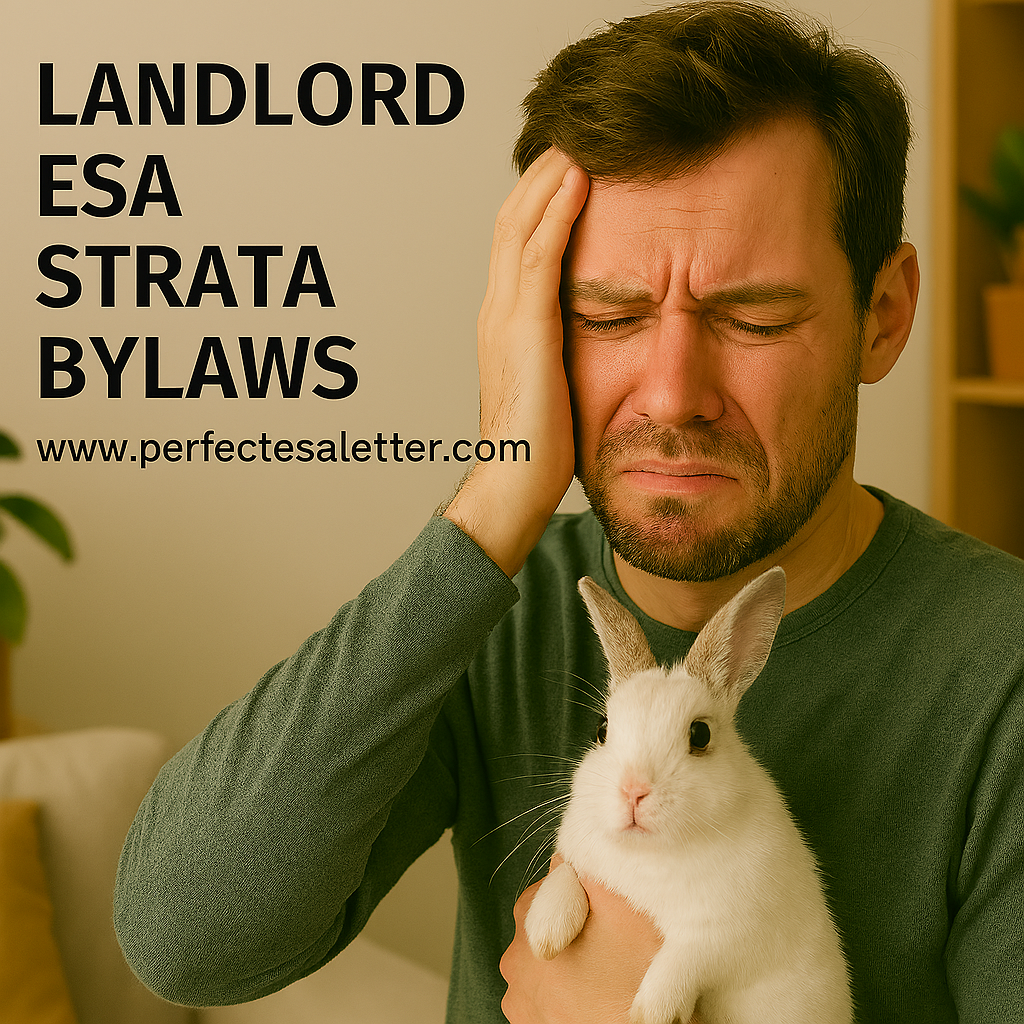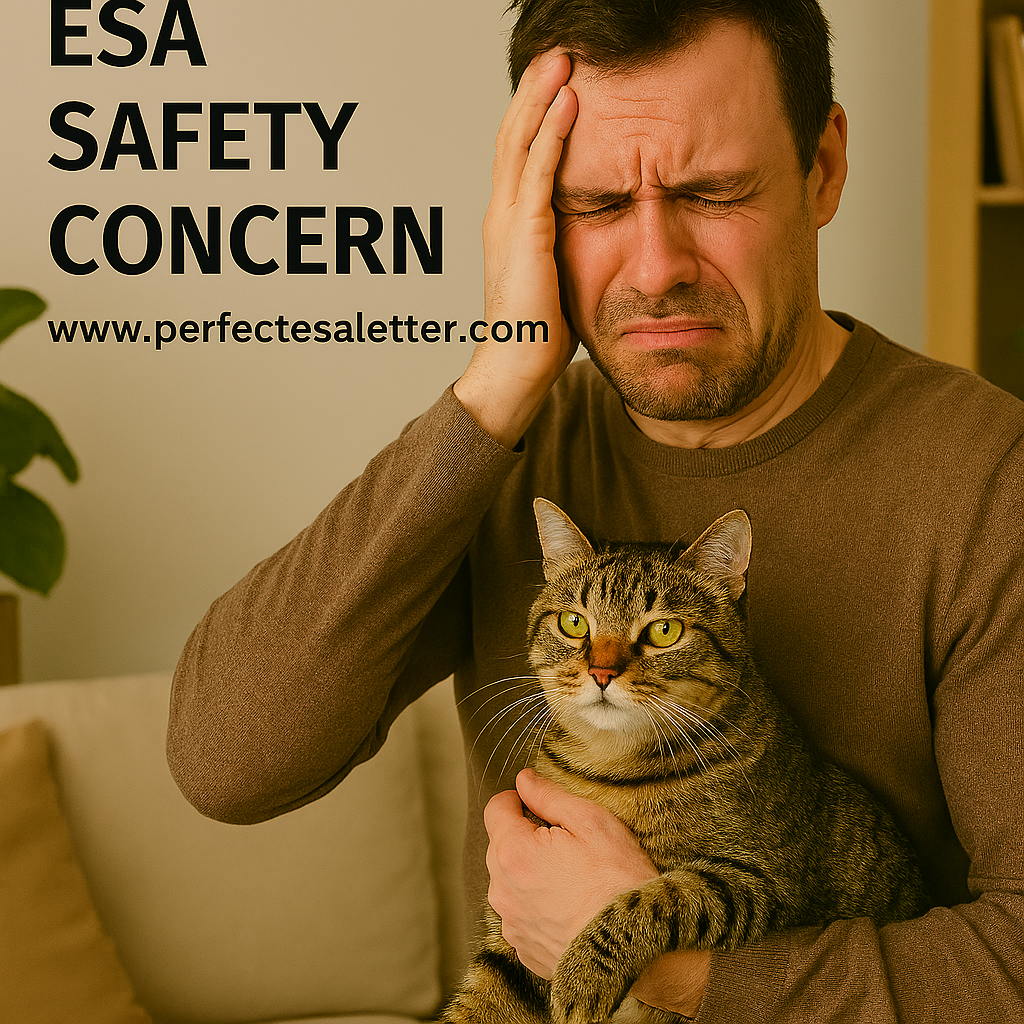Navigating Landlord ESA Strata Bylaws as a Tenant
Article
Introduction
Emotional Support Animals (ESAs) play a critical role in supporting individuals with mental or emotional disabilities. Federal law, particularly the Fair Housing Act (FHA), ensures ESA tenants are entitled to reasonable accommodation, even in properties governed by strata bylaws or condominium regulations.
Strata bylaws often impose rules that can conflict with ESA accommodations. Understanding tenant rights and strategies to navigate these bylaws is crucial to ensuring your ESA is legally permitted and protected
”Get Yours Now!
Don’t wait until a landlord or airline tells you “no pets allowed.” Protect your rights today.
Please fill out this form and our team wil contact you ASAP.
Complete your assessment in minutes , get approved by a licensed professional, and receive your letter within 24 hours.
Understanding Landlord ESA Strata Bylaws
Strata bylaws are rules established by condominium or strata corporations to regulate property management and maintain community standards. Common bylaws affecting ESA tenants may include:
- No Pets Policies
- Many strata bylaws prohibit pets, potentially conflicting with ESA accommodation requirements.
- Breed or Size Restrictions
- Some strata bylaws limit the size or breed of animals allowed on the property.
- Access Restrictions
- Limitations on animals entering common areas, elevators, hallways, or recreation areas.
- Behavior Rules
- Requirements for animals to be leashed, caged, or otherwise controlled.
Important: ESA tenants are entitled to reasonable accommodation. Strata bylaws cannot override federal ESA protections without documented, legitimate risk.
ESA Tenant Rights Regarding Strata Bylaws
- Right to Reasonable Accommodation
- Landlords and strata corporations must allow ESAs, even if bylaws prohibit animals, unless there is a documented health or safety risk.
- Protection from Discrimination
- ESA tenants cannot be denied accommodation solely due to strata rules.
- Exemption from Pet Fees or Deposits
- ESA tenants are not responsible for pet deposits, rent, or other fees associated with strata rules.
- Right to Request Rule Modification
- Tenants can request reasonable modifications to strata bylaws to accommodate their ESA.
- Legal Recourse
- Complaints can be filed with HUD, or tenants may seek legal action if strata bylaws interfere with ESA rights.
Steps to Address Landlord Strata Bylaw Conflicts
- Provide Valid ESA Documentation
- Submit a letter from a licensed mental health professional confirming the necessity of your ESA.
- Review Strata Bylaws
- Identify potential conflicts such as pet bans, breed or size restrictions, or common area access limitations.
- Communicate with Landlord and Strata Board
- Submit a written request for reasonable accommodation, citing federal ESA laws and documentation.
- Document All Communication
- Keep records of emails, letters, approvals, and any discussions regarding ESA accommodation and strata bylaws.
- Educate the Strata Board
- Share HUD guidelines and Fair Housing Act information emphasizing ESA tenant rights and reasonable accommodation requirements.
- Propose Practical Solutions
- Examples include keeping the ESA leashed in common areas, restricting access to specific zones, or using behavior training to minimize conflicts.
- Seek Legal Assistance if Necessary
- Consult a tenant rights attorney to ensure compliance with ESA laws and resolve disputes involving strata bylaws.
Tips for ESA Tenants
- Know Your ESA Rights – Familiarize yourself with federal ESA laws and FHA protections.
- Submit Verified ESA Letters – Legal documentation strengthens accommodation requests.
- Communicate Early – Inform the landlord and strata board about your ESA before moving in or renewing leases.
- Maintain ESA Behavior – Well-trained animals reduce disputes and facilitate approval.
- Document Everything – Keep thorough records of communications and agreements.
Real-Life Example
Alex, an ESA tenant with PTSD, leased a condo in a building with strict strata bylaws prohibiting pets. The strata board initially resisted the ESA request.
Alex provided a valid ESA letter, outlined his ESA’s calm and trained behavior, and cited HUD and FHA guidelines protecting ESA accommodation. He proposed using a leash in shared areas and keeping the ESA primarily within his unit.
The landlord and strata board approved Alex’s ESA, demonstrating that proactive communication, documentation, and reasonable compromise can successfully navigate strata bylaws while safeguarding ESA rights.
FAQs
Q1: Can strata bylaws prevent ESA accommodation?
👉 No. ESA tenants are protected under federal law, and reasonable accommodation must be provided even if bylaws prohibit pets.
Q2: Can strata corporations charge fees for ESA accommodation?
👉 No. ESA tenants cannot be charged pet deposits, pet rent, or fees due to strata rules.
Q3: How can tenants address conflicts with strata bylaws?
👉 Submit ESA documentation, request reasonable accommodation, and communicate with both the landlord and strata board.
Q4: What if the strata board refuses ESA accommodation?
👉 File a HUD complaint or consult a tenant rights attorney for legal recourse.
Q5: Should all interactions with the strata board be documented?
👉 Yes. Documentation protects ESA rights and supports dispute resolution.
Conclusion
ESA tenants may encounter strata bylaws that seem to conflict with their rights. Federal law protects ESA tenants, and property rules cannot override these protections. By providing valid documentation, communicating proactively, offering practical solutions, and documenting interactions, tenants can secure ESA accommodation while respecting strata regulations.
Understanding ESA rights under the Fair Housing Act ensures housing stability, legal protection, and a cooperative relationship between tenants, landlords, and strata boards.
”Get Yours Now!
Don’t wait until a landlord or airline tells you “no pets allowed.” Protect your rights today.
Please fill out this form and our team wil contact you ASAP.
Complete your assessment in minutes , get approved by a licensed professional, and receive your letter within 24 hours.










